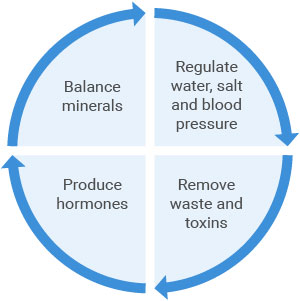What are kidneys?
The kidneys are 2 organs at the back of your body on either side of your backbone (spine), just above the waist. Each one is about the size of your fist.
What do kidneys do?
Some of the important things the kidneys do are:
- remove waste from the blood
- control water and balance chemicals
- control blood pressure
Your blood filters through your kidneys. Each kidney has about a million tiny units called nephrons. Nephrons are made up of little filters (glomerulus) that take out waste, toxins, and extra water from the blood. The cleaned blood is then sent back to your body. The waste is turned into urine, which leaves the body when you empty your bladder (pee). Most people make about 2 liters (8 cups) of urine a day.
Why are the kidneys important?
Kidneys are as important as your heart and lungs!

Credit: Alberta Health Services Living Donor Program
The kidneys balance your body's water, salt, and minerals. They also remove waste, like urea and creatinine. Urea is what’s left over after our bodies break down proteins from food. Creatinine is waste from muscles. Kidneys are also important for making red blood cells (hemoglobin) and for controlling blood pressure.
To learn more about your kidneys, read
Living with Reduced Kidney Function and
Living With Kidney Failure. Your kidney care teams can give you more information if needed, or you can get more information online from the
Kidney Foundation of Canada.
What happens when your kidneys don’t work?
When kidneys don’t work, it’s called kidney failure. Kidney failure happens when the kidneys don’t filter blood properly. This causes wastes and water to collect in the body.
When waste builds up in the blood it can cause you to:
- feel tired
- have a poor appetite (not hungry)
- feel itchy
- feel sick to your stomach (nauseated)
- have trouble breathing
The most common causes of kidney failure are:
- diabetes
- uncontrolled high blood pressure
- autoimmune diseases such as lupus or scleroderma
- genetic diseases like kidney cysts (polycystic kidney disease)
- differences you were born with (congenital)
- chronic kidney infections
- damage from drugs or injury
Kidney disease is often called a silent disease because some people have few symptoms. Or their symptoms are the same as with other illnesses, such as a cold or the flu. That’s why kidney disease can be quite advanced before it’s diagnosed.
How is kidney failure treated?
Treatment options for kidney failure include kidney transplant, hemodialysis, peritoneal dialysis, and conservative care. Dialysis means to filter or clean the blood:
- hemodialysis – through direct access to the blood system
- peritoneal dialysis – indirectly through your belly
To learn more about treatment options and dialysis for kidney failure go to
Treatment options for failing kidneys and watch the videos.
Most of the time, a kidney transplant is the best way to treat someone with kidney failure or end-stage kidney disease (the recipient). Not everyone with kidney failure can get a kidney transplant. The transplant program will assess each person who is being considered as a recipient.
It’s important for you to know that kidney transplant is a treatment option,
not a cure, for kidney failure. Kidney transplant is considered the best treatment for kidney failure for people who are eligible for a kidney transplant.
Kidney transplant to treat kidney disease
Kidney transplant is
not possible for everyone with kidney disease.
Unlike dialysis, which can happen right away if needed, it takes time to plan and get ready for transplant. Learning about transplant early can help with the planning needed to move forward.
It can take 6 months or longer to know if a transplant is right for you (the assessment). It can take longer if you need extra tests.
The assessment helps show the risk of doing the transplant. For example, the risk of transplant surgery is much higher if you have heart disease than if you have a healthy heart. Understanding the risk helps you and the transplant team make the best decision about whether a transplant is right for you.
Facts about kidney transplant:
- For people who are eligible for a transplant, it’s the best option for treating their kidney disease.
- Transplant is a treatment. It’s
not a cure for kidney disease.
- Kidney transplant won’t treat or cure other health problems such as arthritis or diabetes.
- People who have successful transplants no longer need dialysis.
